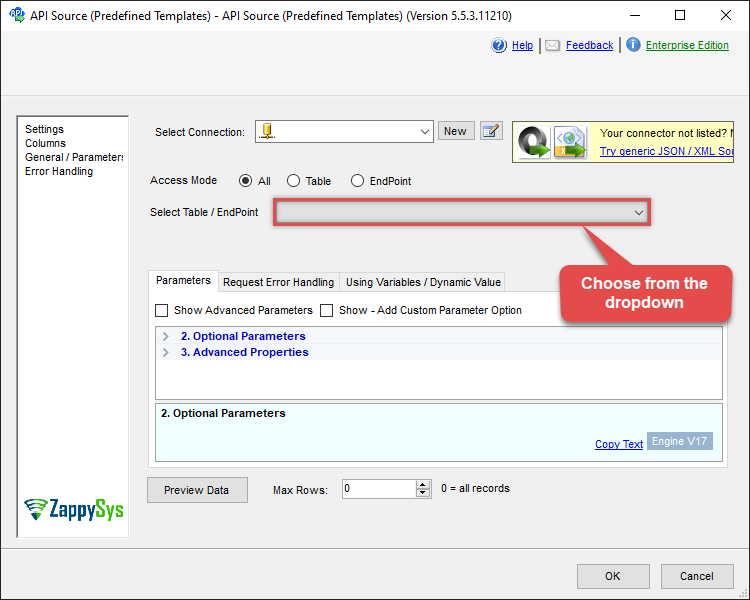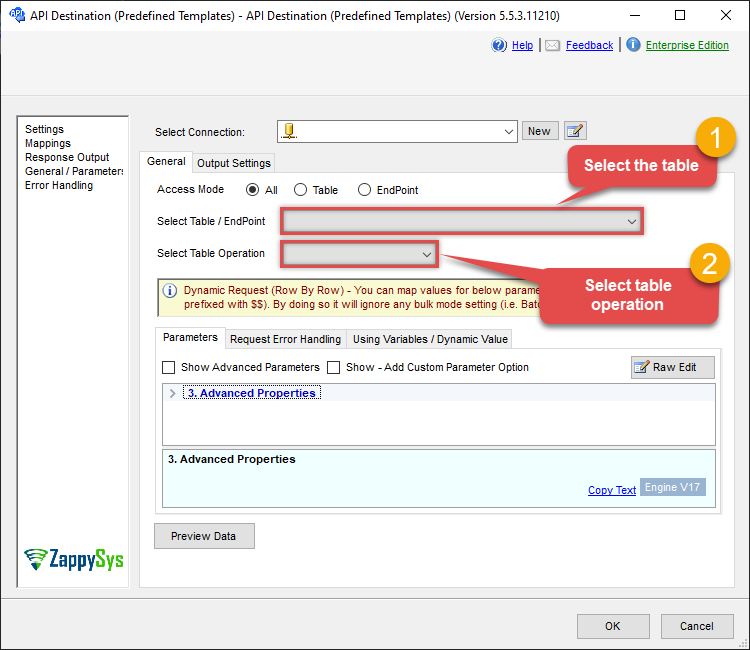Endpoint List Files
Name
list_files
Description
No description available [API reference]
Related Tables
Files
, FilesFolders
, Folders
, SharedWithMe (Not valid for Application Creds or other user)
Parameters
| Parameter | Required | Options | ||||||||||||||||||
|---|---|---|---|---|---|---|---|---|---|---|---|---|---|---|---|---|---|---|---|---|
|
Name:
Label: Drive Id / Shared Folder Specify a drive |
YES | |||||||||||||||||||
|
Name:
Label: Default Group or User Id (additional Scopes needed to list - If fails enter manually) To list all users and groups from your organizations you need additional scopes. See connection UI - Choose User.Read.All and Group.Read.All Scopes and regenerate token. You can manually type value too if you know Group or User Id. Format is /users/{id} OR /groups/{id} |
|
|||||||||||||||||||
|
Name:
Label: Search Type (Default=Recursive) If you do not wish to see files from child folders then use Non-Recursive option. Recursive option has certain limitations (e.g. Only indexed files will appear so it takes time to show up in the list). If you do not see some files listed in the output then use Non-Recursive option (must specify Parent Folder Path in SearchPath property). |
|
|||||||||||||||||||
|
Name:
Label: Search Path (Default=Root Folder) - Max 200 listed |
||||||||||||||||||||
|
Name:
Label: Order By Field(s) - Only for Recursive SearchType Order by Field(s) for output. You can order by single or multiple fields and use filed suffix asc for ascending and desc for descending order. For example to order by lastModifiedDateTime in descending order use lastModifiedDateTime desc. To order by nested field you can supply lastModifiedBy/user/email asc |
|
Output Columns
| Label | Data Type (SSIS) | Data Type (SQL) | Length | Description |
|---|---|---|---|---|
| id |
DT_WSTR
|
nvarchar(500)
|
500 | |
| name |
DT_WSTR
|
nvarchar(150)
|
150 | |
| size |
DT_I8
|
bigint
|
||
| createdDateTime |
DT_DBTIMESTAMP
|
datetime
|
||
| lastModifiedDateTime |
DT_DBTIMESTAMP
|
datetime
|
||
| webUrl |
DT_WSTR
|
nvarchar(1500)
|
1500 | |
| webUrlPath |
DT_WSTR
|
nvarchar(1500)
|
1500 | |
| createdBy_user_id |
DT_WSTR
|
nvarchar(200)
|
200 | |
| createdBy_user_email |
DT_WSTR
|
nvarchar(150)
|
150 | |
| createdBy_user_displayName |
DT_WSTR
|
nvarchar(100)
|
100 | |
| createdBy_application_id |
DT_WSTR
|
nvarchar(200)
|
200 | |
| createdBy_application_displayName |
DT_WSTR
|
nvarchar(100)
|
100 | |
| lastModifiedBy_user_id |
DT_WSTR
|
nvarchar(200)
|
200 | |
| lastModifiedBy_user_email |
DT_WSTR
|
nvarchar(150)
|
150 | |
| lastModifiedBy_user_displayName |
DT_WSTR
|
nvarchar(150)
|
150 | |
| lastModifiedBy_application_id |
DT_WSTR
|
nvarchar(200)
|
200 | |
| lastModifiedBy_application_displayName |
DT_WSTR
|
nvarchar(150)
|
150 | |
| parentReference_id |
DT_WSTR
|
nvarchar(200)
|
200 | |
| parentReference_driveId |
DT_WSTR
|
nvarchar(400)
|
400 | |
| parentReference_driveType |
DT_WSTR
|
nvarchar(100)
|
100 | |
| parentReference_name |
DT_WSTR
|
nvarchar(200)
|
200 | This is only returned when calling lookup or /children call (e.g. /items/root:/[folder-name] OR /items/[item-id] ) |
| parentReference_siteId |
DT_WSTR
|
nvarchar(200)
|
200 | |
| parentReference_path |
DT_WSTR
|
nvarchar(1000)
|
1000 | This is only returned when calling lookup or /children call (e.g. /items/root:/[folder-name] OR /items/[item-id] ) |
| fileSystemInfo_createdDateTime |
DT_DBTIMESTAMP
|
datetime
|
||
| fileSystemInfo_lastModifiedDateTime |
DT_DBTIMESTAMP
|
datetime
|
||
| folder_childCount |
DT_I8
|
bigint
|
||
| file_mimeType |
DT_WSTR
|
nvarchar(300)
|
300 | |
| file_quickXorHash |
DT_WSTR
|
nvarchar(200)
|
200 | |
| file_sha1Hash |
DT_WSTR
|
nvarchar(200)
|
200 | |
| file_sha256Hash |
DT_WSTR
|
nvarchar(200)
|
200 | |
| shared_scope |
DT_WSTR
|
nvarchar(100)
|
100 | |
| remoteItem_parentReference_id |
DT_WSTR
|
nvarchar(200)
|
200 | |
| remoteItem_parentReference_driveId |
DT_WSTR
|
nvarchar(400)
|
400 | |
| remoteItem_parentReference_driveType |
DT_WSTR
|
nvarchar(100)
|
100 | |
| remoteItem_parentReference_name |
DT_WSTR
|
nvarchar(200)
|
200 | |
| remoteItem_parentReference_siteId |
DT_WSTR
|
nvarchar(200)
|
200 | |
| remoteItem_parentReference_path |
DT_WSTR
|
nvarchar(1000)
|
1000 | |
| remoteItem_shared_scope |
DT_WSTR
|
nvarchar(100)
|
100 | |
| remoteItem_shared_sharedDateTime |
DT_DBTIMESTAMP
|
datetime
|
||
| remoteItem_sharedBy_user_id |
DT_WSTR
|
nvarchar(200)
|
200 | |
| remoteItem_sharedBy_user_email |
DT_WSTR
|
nvarchar(150)
|
150 | |
| remoteItem_sharedBy_user_displayName |
DT_WSTR
|
nvarchar(150)
|
150 | |
| remoteItem_sharepointIds_listId |
DT_WSTR
|
nvarchar(200)
|
200 | |
| remoteItem_sharepointIds_listItemId |
DT_WSTR
|
nvarchar(200)
|
200 | |
| remoteItem_sharepointIds_listItemUniqueId |
DT_WSTR
|
nvarchar(200)
|
200 | |
| remoteItem_sharepointIds_siteId |
DT_WSTR
|
nvarchar(200)
|
200 | |
| remoteItem_sharepointIds_siteUrl |
DT_WSTR
|
nvarchar(200)
|
200 | |
| remoteItem_sharepointIds_tenantId |
DT_WSTR
|
nvarchar(200)
|
200 | |
| remoteItem_sharepointIds_webId |
DT_WSTR
|
nvarchar(200)
|
200 | |
| id_path |
DT_WSTR
|
nvarchar(200)
|
200 |
Input Columns
| Label | Data Type (SSIS) | Data Type (SQL) | Length | Description | |||||||||||||||||||||||||||||||||||||||||||||||||||||||||||||||||||||||||||||||||||||||||||||||
|---|---|---|---|---|---|---|---|---|---|---|---|---|---|---|---|---|---|---|---|---|---|---|---|---|---|---|---|---|---|---|---|---|---|---|---|---|---|---|---|---|---|---|---|---|---|---|---|---|---|---|---|---|---|---|---|---|---|---|---|---|---|---|---|---|---|---|---|---|---|---|---|---|---|---|---|---|---|---|---|---|---|---|---|---|---|---|---|---|---|---|---|---|---|---|---|---|---|---|---|
| There are no Static columns defined for this endpoint. This endpoint detects columns dynamically at runtime. | |||||||||||||||||||||||||||||||||||||||||||||||||||||||||||||||||||||||||||||||||||||||||||||||||||
Examples
SSIS
Use OneDrive Connector in API Source or in API Destination SSIS Data Flow components to read or write data.
API Source
This Endpoint belongs to the Files table, therefore it is better to use it, instead of accessing the endpoint directly:
| Required Parameters | |
|---|---|
| Record Filter (Client Side) | Fill-in the parameter... |
| Drive Id / Shared Folder | Fill-in the parameter... |
| Optional Parameters | |
| Default Group or User Id (additional Scopes needed to list - If fails enter manually) | |
| Search Type (Default=Recursive) | search(q='') |
| Search Path (Default=Root Folder) - Max 200 listed | /root |
| Order By Field(s) - Only for Recursive SearchType | |

API Destination
This Endpoint belongs to the Files table, therefore it is better to use it, instead of accessing the endpoint directly. Use this table and table-operation pair to list files:
| Required Parameters | |
|---|---|
| Record Filter (Client Side) | Fill-in the parameter... |
| Drive Id / Shared Folder | Fill-in the parameter... |
| Optional Parameters | |
| Default Group or User Id (additional Scopes needed to list - If fails enter manually) | |
| Search Type (Default=Recursive) | search(q='') |
| Search Path (Default=Root Folder) - Max 200 listed | /root |
| Order By Field(s) - Only for Recursive SearchType | |

ODBC application
Use these SQL queries in your ODBC application data source:
List files in a folder path (Recursive)
Use list_files endpoint to list files recursivly (list from child folder). However there are some limitations to list recursively, such as some new files may not appear right away or files not indexed wont show up.
SELECT * FROM list_files
WITH(
Filter='$.value[*]' --list both files and folders
--Filter='$.value[?(@.file.mimeType != null)]' --list only files
--Filter='$.value[?(@.folder.childCount != null)]' --list only folders
,DriveId='b!GtLN726LE0eY5F2BBNi14wMKmwdpCDFMn1d71ra11GuQ4DORpHy-Sa5UzSpkaY9E'
--,SearchPath='/root' --folder path
--,SearchPath='/root:/myfolder:' --folder path
,SearchPath='/root:/myfolder/subfolder:' --folder path nested
,OrderBy='lastModifiedDateTime desc'
)
--You can get DriveId by selecting from 'Drives' table.
--You can get SearchPath by selecting from 'list_root' table OR selection from 'list_folder'.List files from Group / other User's drive
This example shows how to read files from Group or other User's drive. You must use SearchType='children' for this purpose (known issue: recursive option may not work correctly in some cases).
SELECT * FROM list_files
WITH(
GroupOrUserId='/groups/138eb458-84f0-4928-bbe6-df663bd1fcea'
, DriveId='b!VxnFPrt3C0GQnQ70Skx-p9_Eqvvac5pGhvqzoRdUpnZb-G5HVC0WTbLU3a89b4LJ'
, SearchType='children'
, SearchPath='/root:/folder/subfolder:'
--, Filter='$.value[*]' --list both files and folders
--, Filter='$.value[?(@.folder.childCount != null)]' --list only folders
)List All Files (Recursive)
Lists all files (recursive)
SELECT * FROM FilesList All Files and Folders (Recursive)
Lists all files and folders recursively
SELECT * FROM FilesFoldersList All Folders (Recursive)
Lists all folders recursively (exclude files)
SELECT * FROM FoldersList All Files and Folders Shared with Me
Lists all files / folders shared with me. To List shared file inside a specific folder use FilesFolders table (e.g. select * from FilesFolders WITh(DriverId='zzzzz', SearchPath='zzzz') ). Provide DriveId (Found in SharedWithMe Table - see remoteItem_parentReference_driveId column) and optionally supply SearchPath (e.g. /root:/folder/subfolder: ) from which you like to list files/folders.
SELECT * FROM SharedWithMe
list_files endpoint belongs to
Files
, FilesFolders
, Folders
, SharedWithMe
table(s), and can therefore be used via those table(s).
SQL Server
Use these SQL queries in SQL Server after you create a data source in Data Gateway:
List files in a folder path (Recursive)
Use list_files endpoint to list files recursivly (list from child folder). However there are some limitations to list recursively, such as some new files may not appear right away or files not indexed wont show up.
DECLARE @MyQuery NVARCHAR(MAX) = 'SELECT * FROM list_files
WITH(
Filter=''$.value[*]'' --list both files and folders
--Filter=''$.value[?(@.file.mimeType != null)]'' --list only files
--Filter=''$.value[?(@.folder.childCount != null)]'' --list only folders
,DriveId=''b!GtLN726LE0eY5F2BBNi14wMKmwdpCDFMn1d71ra11GuQ4DORpHy-Sa5UzSpkaY9E''
--,SearchPath=''/root'' --folder path
--,SearchPath=''/root:/myfolder:'' --folder path
,SearchPath=''/root:/myfolder/subfolder:'' --folder path nested
,OrderBy=''lastModifiedDateTime desc''
)
--You can get DriveId by selecting from ''Drives'' table.
--You can get SearchPath by selecting from ''list_root'' table OR selection from ''list_folder''.';
EXEC (@MyQuery) AT [LS_TO_ONEDRIVE_IN_GATEWAY];List files from Group / other User's drive
This example shows how to read files from Group or other User's drive. You must use SearchType='children' for this purpose (known issue: recursive option may not work correctly in some cases).
DECLARE @MyQuery NVARCHAR(MAX) = 'SELECT * FROM list_files
WITH(
GroupOrUserId=''/groups/138eb458-84f0-4928-bbe6-df663bd1fcea''
, DriveId=''b!VxnFPrt3C0GQnQ70Skx-p9_Eqvvac5pGhvqzoRdUpnZb-G5HVC0WTbLU3a89b4LJ''
, SearchType=''children''
, SearchPath=''/root:/folder/subfolder:''
--, Filter=''$.value[*]'' --list both files and folders
--, Filter=''$.value[?(@.folder.childCount != null)]'' --list only folders
)';
EXEC (@MyQuery) AT [LS_TO_ONEDRIVE_IN_GATEWAY];List All Files (Recursive)
Lists all files (recursive)
DECLARE @MyQuery NVARCHAR(MAX) = 'SELECT * FROM Files';
EXEC (@MyQuery) AT [LS_TO_ONEDRIVE_IN_GATEWAY];List All Files and Folders (Recursive)
Lists all files and folders recursively
DECLARE @MyQuery NVARCHAR(MAX) = 'SELECT * FROM FilesFolders';
EXEC (@MyQuery) AT [LS_TO_ONEDRIVE_IN_GATEWAY];List All Folders (Recursive)
Lists all folders recursively (exclude files)
DECLARE @MyQuery NVARCHAR(MAX) = 'SELECT * FROM Folders';
EXEC (@MyQuery) AT [LS_TO_ONEDRIVE_IN_GATEWAY];List All Files and Folders Shared with Me
Lists all files / folders shared with me. To List shared file inside a specific folder use FilesFolders table (e.g. select * from FilesFolders WITh(DriverId='zzzzz', SearchPath='zzzz') ). Provide DriveId (Found in SharedWithMe Table - see remoteItem_parentReference_driveId column) and optionally supply SearchPath (e.g. /root:/folder/subfolder: ) from which you like to list files/folders.
DECLARE @MyQuery NVARCHAR(MAX) = 'SELECT * FROM SharedWithMe';
EXEC (@MyQuery) AT [LS_TO_ONEDRIVE_IN_GATEWAY];
list_files endpoint belongs to
Files
, FilesFolders
, Folders
, SharedWithMe
table(s), and can therefore be used via those table(s).
